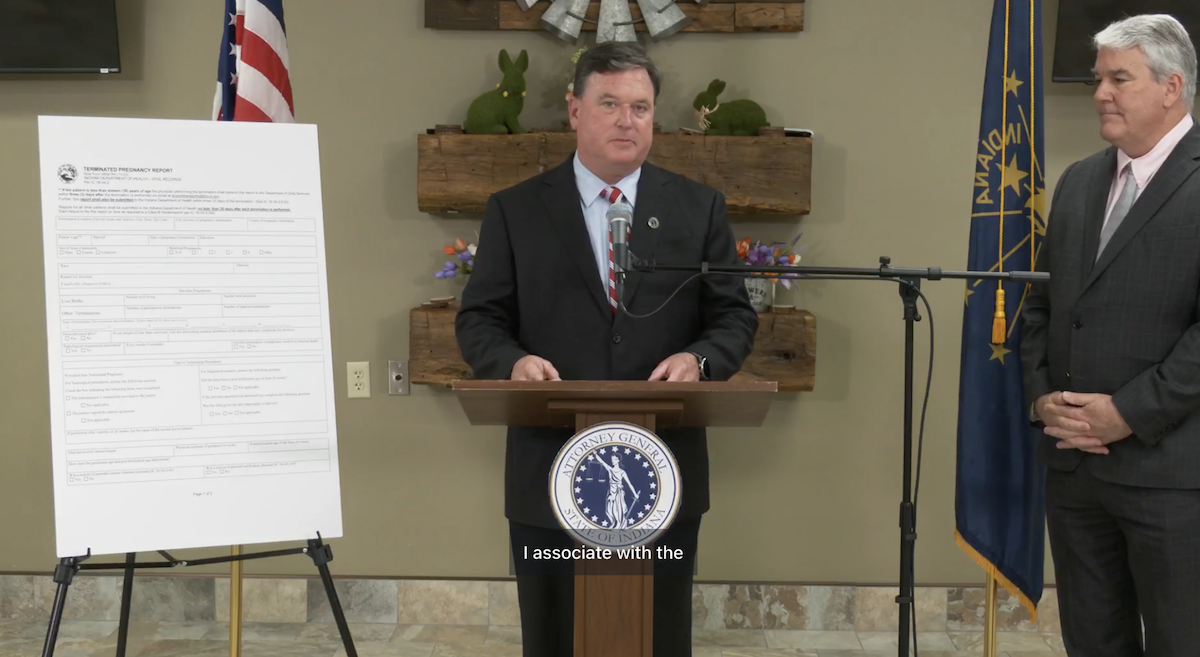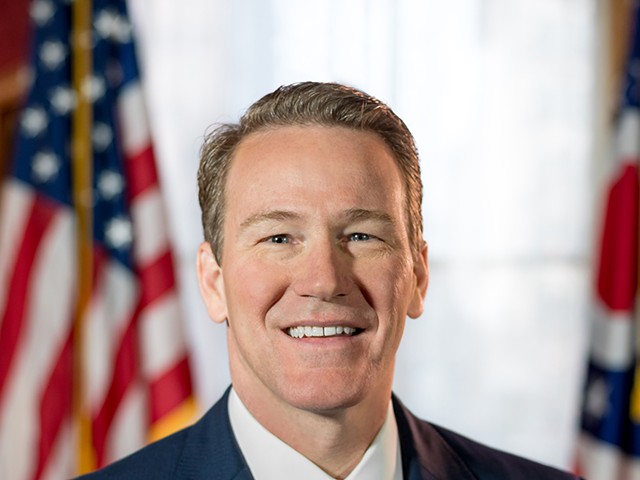Indiana Attorney General Todd Rokita on Thursday called out the Indiana Department of Health and Indiana Public Access Counselor for “collusion” and issued a non-binding advisory opinion saying terminated pregnancy reports are public records.
“You have a right to sue the state of Indiana. That’s the bottom line. You have a right to these documents,” he said during a Facebook Live event. “And no unelected bureaucrat can tell you otherwise.”
Rokita issued the opinion in response to a request from Huntington Republican Sen. Andy Zay. Zay inquired about the documents after a change in procedure the Indiana Department of Health (IDOH) instituted in December.
Before then, the reports – while redacted – were regularly released under Indiana’s Access to Public Records Act.
IDOH changed its policy after the state’s new abortion ban went into effect, which meant providers performed fewer abortions. State health officials were worried that information on the report could indirectly identify the women getting the procedure and sought a ruling from Indiana’s Public Access Counselor.
Among the data collected on the terminated pregnancy reports, or TPRs for short, is the age, education and marital status of the woman, the date of the abortion, gestational age of the fetus, race and ethnicity of the woman, as well as the city and county where the abortion occurred.
Public Access Counselor Luke Britt found that the report could be “reverse engineered to identify patients — especially in smaller communities.”
He agreed with IDOH that the required quarterly reports should suffice in terms of satisfying any disclosure and transparency considerations. And Britt said the records, created by doctors, fall under the provider-patient relationship as medical records.
Britt’s ruling also isn’t binding, however. And Rokita noted that IDOH never asked the Attorney General’s Office for legal advice even though he is the state’s attorney.
A response from IDOH reaffirmed its stance that the records are confidential under Indiana law, referring to Britt’s opinion. They did not comment on Rokita’s position.
New legal opinion
Rokita came to a different conclusion in his 11-page opinion, saying the reports are not protected medical records.
“Although the term “medical record” is not defined, its ordinary meaning and context indicate that the term refers to confidential patient records maintained by providers for diagnosis, treatment, and prognosis. TPRs do not fall into that category. TPRs are reports submitted to a public agency for purposes of evaluating compliance with state statutes governing abortion,” Rokita’s opinion said.
Destiny Wells, who is running for Attorney General as a Democrat, rebutted Rokita’s opinion in a statement.
“Hoosier women are outraged by Attorney General Todd Rokita’s actions today regarding private health data. There is no excuse for subjecting Hoosiers to Todd Rokita’s state sanctioned breach of patient confidentiality.”
Last year, Rokita’s office brought a professional licensing action against Dr. Caitlin Bernard for breaking patient confidentiality by telling a reporter a 10-year-old girl came from Ohio to get an abortion after a rape.The girl was never publicly identified but the Indiana Medical Licensing Board found that Bernard did break privacy protocols. She was given a letter of reprimand and a $3,000 fine.
Rokita said Thursday the smaller number of abortions still doesn’t make the patient more identifiable.
“The Department of Health … can still redact certain bits of information here that anyone finds could lead to the identification of pregnant women although I don’t think that’s at all likely,” Rokita said. “Partial redactions are legal and it is an option to solve whatever conceived problem the Department of Health thinks it has.”
Zay said if that was done, he wouldn’t have a problem with it. He called Rokita’s opinion a “wake-up call to the agency to correct themselves before we need to get involved as legislators.”
Rokita said he sent letters to Gov. Eric Holcomb and legislative leaders during session about the issue, but they took no action.
He said there is information on the report that his office needs to investigate whether doctors are in compliance with Indiana law. Some of that is still available in the quarterly reports IDOH issues.
But those documents don’t include all information, such as the name of the doctor, the dates of the abortion and whether the reports were filed on time.
This story was originally published by the Indiana Capital Chronicle and republished here with permission.





